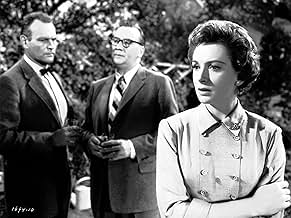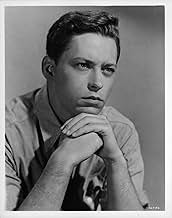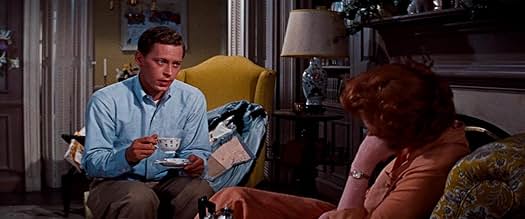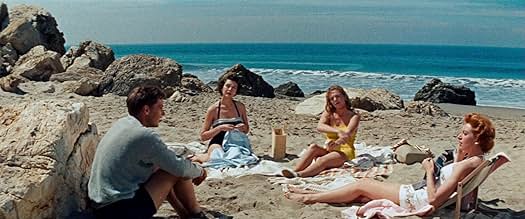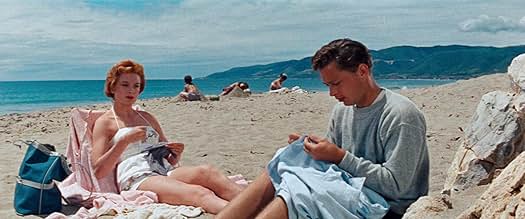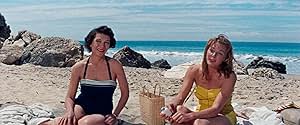Ajouter une intrigue dans votre langueA new senior at a boy's prep school, finds himself harassed by the machismo culture of his classmates and the unfeelingly behavior by his father, only being treated with decency by his roomm... Tout lireA new senior at a boy's prep school, finds himself harassed by the machismo culture of his classmates and the unfeelingly behavior by his father, only being treated with decency by his roommate and with affection by the coach's wife.A new senior at a boy's prep school, finds himself harassed by the machismo culture of his classmates and the unfeelingly behavior by his father, only being treated with decency by his roommate and with affection by the coach's wife.
- Réalisation
- Scénario
- Casting principal
- Nomination aux 1 BAFTA Award
- 1 victoire et 3 nominations au total
- Bob
- (non crédité)
- Alex
- (non crédité)
- Boy in Soda Fountain
- (non crédité)
Avis à la une
I didn't find this movie dated at all. Not only does it offer a glimpse of what life was like in the 1950's, which should have some historical significance to younger folks today, but its message regarding the stifling conditions of rigid social conformity is ageless. Although it is obviously a stage adaptation, praise goes to director Vincente Minnelli for so ably bringing it to the wide screen. The three leads, Deborah Kerr, John Kerr (no relation), and Leif Erickson, who all revived their original Broadway roles, are exceptional. I also loved the scene when Al (Daryl Hickman), Tom's socially pressured roommate, attempts to provide Tom with tips on how to appear more manly to the world. Norma Crane, who wonderfully played Golde in the film version of "Fiddler on the Roof", perfectly portrays the very cruel town harlot, Ellie Martin. Ironically, Edward Andrews depicts Tom's demanding father as anything but manly, perhaps intentionally. Be as I say, Tommy, not as I am.
While Tom at first appears to be the focus of the film, the stories of Laura and Bill Reynolds, his dorm house parents, slowly begin to overshadow Tom's miserable situation. This represents some excellent work by screenplay writer Robert Anderson, who also wrote first-rate scripts for "The Nun's Story", "The Sand Pebbles, and "I Never Sang For My Father." And what is Bill Reynolds doing at the end of the movie? Listening to phonograph records by himself. What's the matter with him? My only criticism is that it runs a bit long and could have been reduced in length without losing its powerful impact.
Women were still patronized, there were still clear role boundaries (witness the scene where Tom is knitting and catches derision for spending ten minutes in a sewing circle.) Not sure why that was a crime of the century, but whatever.
Deborah Kerr is tender and memorable as an unhappy wife to the school master at a prep school who realizes her marriage is a sham. She realizes this when she sympathizes with a student and resident at her home, a confused young man who simply is shy and has doubts about his future. There are some nuances regarding sexuality, but in all honesty that was a side-story, from what I inferred.
The message I take away from this film is not simply about ostracism and hatred; Minnelli as director also addresses female emotion, the reasons why Kerr empathizes with the young man, and how he eventually moves on. In the long rung, it is life affirming, although rather opaque in its message.
Discrimination and hatred take many forms, and sometimes the subtler forms are most repellent. Highly recommended. 8/10.
Le saviez-vous
- AnecdotesBringing the play to the screen resulted in a years-long struggle with the production code office and the Catholic National Legion of Decency because of the play's inclusion of homosexuality, adultery and prostitution. At one point there was consideration that the film be produced by an independent production company outside of the studio system.
- GaffesWhile Tom Lee (Class of 1946) is still in school, Laura Reynolds drives a 1950 Dodge.
- Citations
Laura Reynolds: Manliness is not all swagger and mountain climbing. It's also tenderness and gentleness and consideration.
- ConnexionsFeatured in Homo Promo (1991)
- Bandes originalesThe Joys of Love
(Plaisir d'Amour)
Music by Jean-Paul-Égide Martini
French lyrics by Jean-Pierre Claris de Florian
English lyrics by Richard Dyer-Bennett
Performed by John Kerr (dubbed by Gene Merlino)
Meilleurs choix
- How long is Tea and Sympathy?Alimenté par Alexa
Détails
Box-office
- Budget
- 1 737 000 $US (estimé)
- Durée
- 2h 2min(122 min)
- Mixage
- Rapport de forme
- 2.55 : 1


